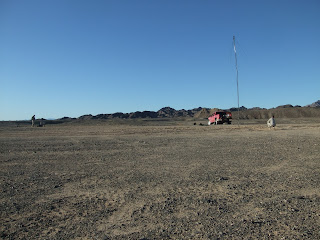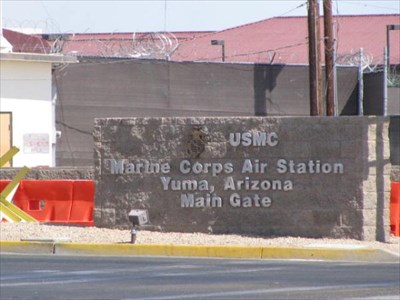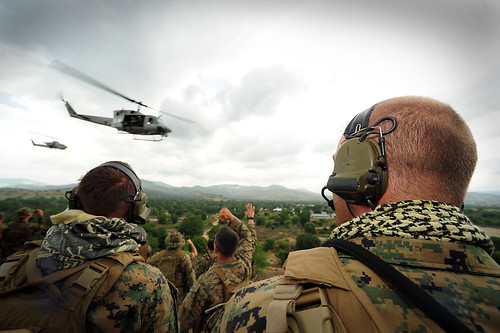First, the obvious:: I'll be in Lashkar Gah at a British base, vice Camp Leatherneck, a Marine base. I expect the primary differences to be:
- Instead of being literally at the flag pole, I'll be far removed from it, allowing me greater freedom and independence as long as I do my job;
- I'll have a shift job, expected to be just 8 hours a day; vice the average 14-hour days of last time;
- I'll have less overall responsibility but a more direct role in operations in support of ground forces
- I'll be eating a lot more curry
All that is self-evident. But there are a few other things I'd like to change.
First, while I PT'd hard for the first half or so, when winter came and March still seemed an eternity away, I pretty much lost my drive and my PT, when it happened, was mostly weak and unproductive. This time I intend to push myself hard the entire time and come back in - objectively - the best shape of my life. That's a pretty bold statement to make, especially in public like this, but I think I can do it.
Second, as some of you know I've been working on a book, on and off, for more years than I care to admit. Again, these aren't the kinds of things I usually say in public but my aim is to finish this thing. Probably it will be terrible. That's OK. My problem has been that I've gone over and over the same ground in my writing - refining, reworking, perfecting, whittling it to the bone, and while that's yielded some quality (IMHO), it's come at the price of quantity. It's time to write out the rest of the story and then go back and improve it.
Third - and this is the one that affects you - I want my friends and family back home to be more involved in my deployment. I believe that all Americans need to be personally invested in wars fought on their behalf, yet when you asked me, as so many of you did, what you could do or send, I fell into the trap of saying "don't worry about it, we've got everything we need here" because that was easier than thinking about what you really can do for us over there.
It's true that we have everything we need over there. A person needs very little. But there is plenty that we would like - would love - to have and we shouldn't be afraid to share that with those who want to support us. So here: I give you a list of things you can send us or do for us - a list based on a little more experience than I had last time, and one that you can feel free to share with others.
- Write. This is definitely number one. Whether it's a two-page letter or a two-line e-mail, we want to hear from you. Even if it's been a year or 3 or 10 since we last spoke, this is the perfect time to renew acquaintances. Any contact with home puts a smile on our faces and helps us sleep better that night.
- Give of your time and/or money to an organization that supports the troops (then write us to let us know you've done it). Here are a few of my personal favorites, but there are many to choose from:
- Semper Fi Fund - Provides support and assistance to wounded Marines and Sailors and their families
- Wounded Warrior Project
- United Service Organization (USO)
- Project MOT
- Make a CD or DVD. My dad sent me one a week for almost my entire deployment, with news and sports round-ups, videos of old concerts and movies, pictures of the neighborhood (the White Mountain National Forest and environs) and a "from the producer" segment each week. I know he's planning to do that again, but you can make me other DVDs - recent episodes of shows like House, The Office, Family Guy, Tosh.0, SNL etc. etc., or "mix tapes" of whatever the kids are listening to these days (not much radio in Afg).
- Magazines and books - but not in the mail. Yes, several of you sent me these last time and believe me, it was great to get them and I devoured them all. But it seems lots easier and cheaper to send e-books and e-mags, which you can do easily here. You don't even have to buy the book - as a reading fanatic what I value most is just getting book recommendations from friends.
- Care packages. As I've written before, what you put in them matters much less than just knowing that you took the time to put it together and send it. Let's face it - care packages are a pain in the ass to put together. But here are some ideas of things to put in them, in addition to all of the above:
- Home made treats
- Beef jerky
- Crystal Lite (any flavor but especially fruit punch)
- Mixed nuts
- Nerf guns - really anything nerf
- Sugar-free gum
- Crosswords and other puzzle books
- Blank cards/stationary (so we can write back!)
- Crisp hundred-dollar bills (crinkled ones may be returned)
- Get on Skype, g-chat, etc., so when we have unexpected Internet access we can talk!
Lastly, you should know that when it comes to care packages, the cheapest option is to use the USPS flat rate box for APO/FPO, which you should be able to get at any post office.
OK it's been a busy day here at LeftofRight...time for bed!



























































